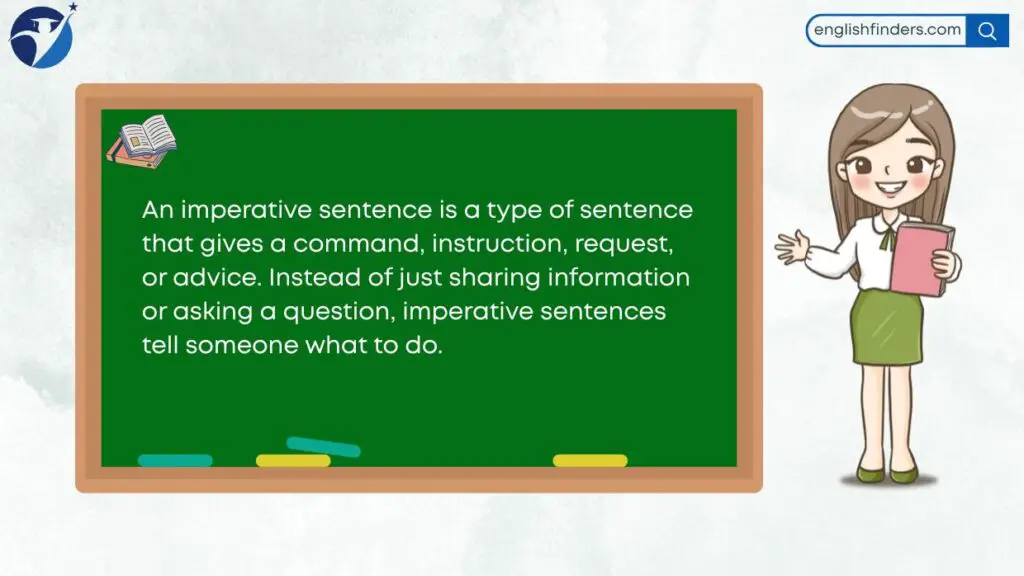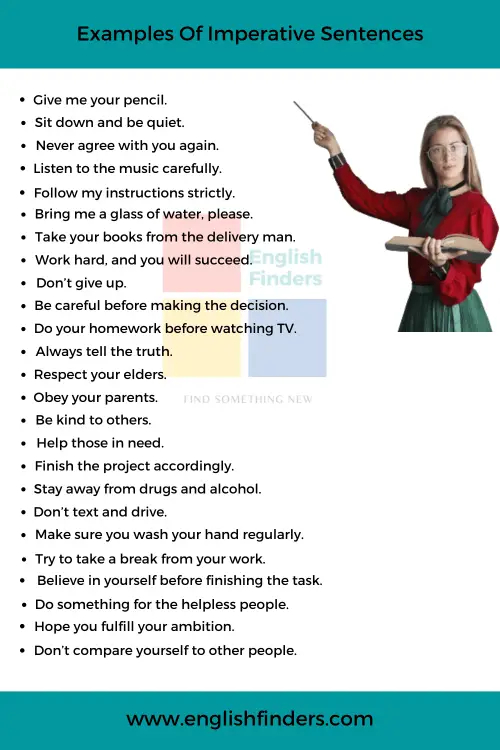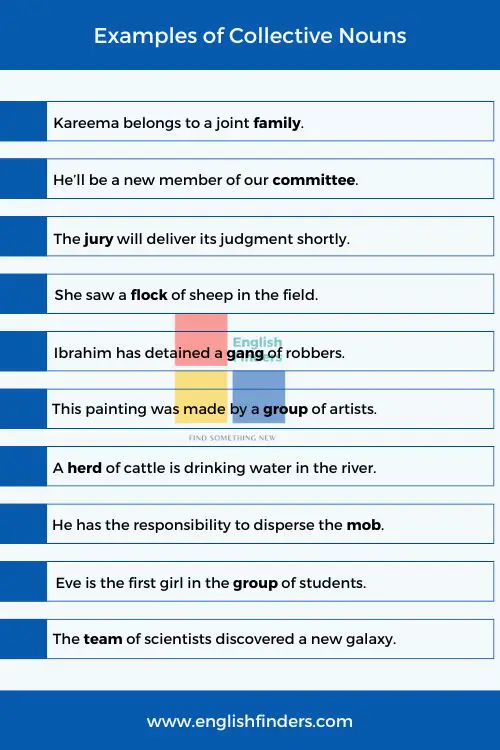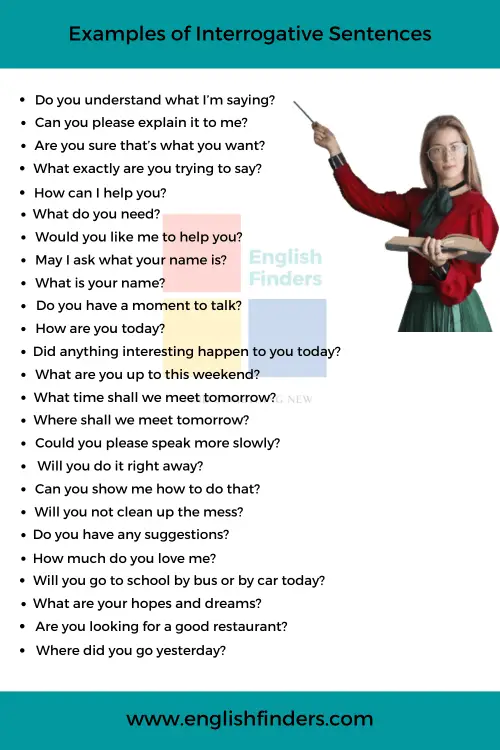Last updated on May 21st, 2025 at 11:24 am
Have you ever been told, “Help the poor,” or heard someone say, “Please be quiet”? These are great examples of imperative sentences. Imperative sentences are all around us — in classrooms, at home, in signs we see on the street, and even in our favorite apps. They help us give instructions, make requests, offer advice, or tell someone what to do.
In simple terms, an imperative sentence is used to give a command or ask someone to do something. It sounds serious sometimes, but it can also be super polite, like when your teacher says, “Please open your books.”
In this lesson, we’ll explore 100 clear and useful examples of imperative sentences to help you understand and use them with confidence.
📘What Are Imperative Sentences?
Quick Navigation

An imperative sentence is a type of sentence that gives a command, instruction, request, or advice. Instead of just sharing information or asking a question, imperative sentences tell someone what to do.
Here’s something cool — the subject of an imperative sentence is usually “you,” but it’s not always written. It’s just understood. For example, when someone says, “Close the window,” they’re really saying, “(You) close the window.”
Let’s look at a few simple examples:
- Command: Stop talking.
- Request: Please help me with this homework.
- Advice: Take a break if you’re tired.
- Instruction: Turn on the computer.
All of these are imperative sentences because they are telling someone to do something. They often begin with a verb and can end with a period or an exclamation mark, depending on the tone.
🔍 How to Identify Imperative Sentences
So now that you’ve seen some examples of imperative sentences, you might have a question: “How can I spot them quickly in a sentence or conversation?” Don’t worry! It’s actually pretty easy once you know what to look for.
Here are a few simple tips to help you identify imperative sentences with confidence:
✅ 1. They Start with a Verb
Most imperative sentences begin with the base form of a verb (also called the root form). You won’t see a subject like “I,” “he,” or “they” at the beginning.
Examples:
- Listen carefully.
- Open your book.
- Turn left at the next light.
In each case, the verb comes first — that’s a big clue!
✅ 2. The Subject Is (Usually) “You” — But It’s Hidden
Imperative sentences are directed at you, the person being spoken to. But the word “you” doesn’t usually appear.
Example:
- Sign the deal. → This means [You] sign the deal.
Even though “you” isn’t written, it’s understood. That’s what makes it an imperative sentence.
✅ 3. They Tell Someone What to Do
If the sentence gives a command, instruction, advice, or request, it’s probably imperative.
Examples:
- Don’t forget your umbrella.
- Please be kind.
- Read the directions before starting.
All of these are asking someone to do something — that’s what imperative sentences do best!
✅ 4. They End with a Period or an Exclamation Mark
Depending on the tone, an imperative sentence may end in a period (.) or an exclamation mark (!).
- Calm or polite tone → Use a period.
- Please close the window.
- Strong or urgent tone → Use an exclamation mark!
- Watch out!
The punctuation can tell you how strongly the sentence is being delivered.
✅ 5. They’re Direct and Straight to the Point
Imperative sentences are usually short, clear, and direct. That’s because they’re meant to quickly tell someone what to do.
Not an Imperative:
- I think you should close the door. ← This is a suggestion.
Imperative:
- Close the door. ← Direct command.
📝 Quick Checklist to Identify Imperative Sentences:
| Feature | Yes or No? |
|---|---|
| Starts with a verb? | ✅ |
| No written subject (“you”)? | ✅ |
| Gives a command or advice? | ✅ |
| Ends with . or ! ? | ✅ |
If you check “Yes” to all, then congratulations — you’ve found an imperative sentence!
📚When Do We Use Imperative Sentences?
Imperative sentences are used all the time — often without us even noticing! From the moment we wake up to when we go to bed, we hear and use them in many different situations. So, when exactly do we use imperative sentences? Let’s break it down with some everyday examples.
✅ 1. Giving Commands
When someone is in charge or needs something done quickly, they use imperative sentences to give direct commands.
- Stand up straight.
- Finish your homework.
- Clean your room.
✅ 2. Making Requests
We often use polite imperative sentences to ask for help or something we need. Adding words like “please” or “kindly” makes the tone softer.
- Please pass the notebook.
- Could you close the door, please?
- Help me with this puzzle.
✅ 3. Offering Advice
Teachers, parents, and friends use imperative sentences to give helpful suggestions.
- Drink more water during the day.
- Take deep breaths when you feel stressed.
- Always be honest with others.
✅ 4. Giving Instructions
Whether it’s a recipe, a game, or a school project, instructions are often written or spoken in imperative form.
- Add two cups of flour.
- Press the green button.
- Draw a circle in the middle of the page.
✅ 5. Giving Warnings or Alerts
When safety is important, imperative sentences are used to give quick and clear warnings.
- Don’t touch the hot pan!
- Watch out for the steps.
- Stay away from the edge.
As you can see, imperative sentences help us communicate clearly and get things done. They’re short, simple, and to the point, which is why they’re so useful in real life.
100 Examples of Imperative Sentences
Now it’s time for the fun part — let’s explore 100 useful examples of imperative sentences that you can hear, read, or even say every day. To make it easier, we’ve grouped them into categories: commands, requests, instructions, advice, warnings, and everyday situations.
Each one helps you understand how imperative sentences work in real life. Let’s take a look!
🔹 A. Commands (25 Examples)
These sentences give direct orders or tell someone to do something immediately.
- Boost your vocabulary.
- Open the window.
- Be quiet.
- Turn off the light.
- Stop running in the hall.
- Do your homework.
- Wash your hands.
- Close the door.
- Line up.
- Stand still.
- Speak clearly.
- Get ready.
- Don’t talk back.
- Pay attention.
- Write your name on the paper.
- Follow the rules.
- Pick up your books.
- Eat your vegetables.
- Don’t touch that!
- Clean your desk.
- Put on your shoes.
- Keep your eyes on the board.
- Stop making noise.
- Do not enter.
- Don’t interrupt.
🔹 B. Requests (20 Examples)
These are polite ways to ask someone to do something.
- Please help me with this.
- Kindly wait here.
- Could you open the window, please?
- Please make your parents happy.
- Give me a hand with this bag.
- Would you mind closing the door?
- Please be quiet.
- Help me carry this box.
- Tell me more about it, please.
- Let me know your opinion.
- Please read this out loud.
- Share your notes with me.
- Stay here with me, please.
- Please don’t forget to call.
- Wait for me.
- Hand me that book.
- Please be on time.
- Could you explain that again?
- Don’t forget to smile!
- Please turn in your assignment.
🔹 C. Instructions (20 Examples)
These are often used in recipes, directions, or classroom settings.
- Turn on the computer.
- Add two spoons of sugar.
- Mix the ingredients well.
- Follow the arrows.
- Press the red button.
- Take a left at the corner.
- Cut the paper in half.
- Glue the pieces together.
- Write the answer on the line.
- Read the instructions carefully.
- Connect the charger.
- Click the submit button.
- Draw a square.
- Paint the background blue.
- Put your name at the top.
- Staple the pages.
- Plug in the device.
- Put the books on the shelf.
- Upload your file.
- Save your work before closing.
🔹 D. Advice (15 Examples)
These give helpful suggestions or guidance.
- Get enough sleep.
- Eat healthy meals.
- Exercise regularly.
- Take a break when needed.
- Study a little every day.
- Stay positive.
- Try your best.
- Keep learning.
- Listen to your parents.
- Don’t be afraid to ask questions.
- Speak up for yourself.
- Stay focused in class.
- Choose your friends wisely.
- Manage your time well.
- Respect others.
🔹 E. Warnings & Prohibitions (10 Examples)
These sentences alert someone to danger or tell them what not to do.
- Don’t touch that wire!
- Be careful with the scissors.
- Don’t go near the fire.
- Watch your step.
- Stay away from the edge.
- Don’t feed the animals.
- Keep out of reach of children.
- Don’t run on wet floors.
- Stay indoors during the storm.
- Do not use your phone while driving.
🔹 F. Everyday Life Sentences (10 Examples)
These come from common, daily conversations and moments.
- Hurry up!
- Don’t be late.
- Text me later.
- Call me when you arrive.
- Wait your turn.
- Check your backpack.
- Let’s go to the hill.
- Enjoy your meal.
- Smile for the photo!
- Keep the change.
100 Mixed Examples Of Imperative Sentences
Let’s see the 100 mixed examples of imperative sentences:
- Please pick up the garbage from the kitchen floor.
- Eat a healthy diet rich in fruits and vegetables.
- Get out of here.
- Give me your pencil.
- Sit down and be silent.
- Don’t move.
- Never agree with you again.
- Listen to the music carefully.
- Follow my instructions strictly.
- Bring me a glass of water, please.
- Take your books from the deliveryman.
- Work hard, and you will succeed.
- Don’t give up.
- Be careful before making the decision.
- Do your homework before watching TV.
- Always tell the truth.
- Respect your elders.
- Obey your parents.
- Be kind to others.
- Help those in need.
- Finish the project accordingly.
- Stay away from drugs and alcohol.
- Don’t text and drive.
- Make sure you wash your hands regularly.
- Don’t leave the house without sunscreen on a sunny day.
- Give your pet plenty of exercise and attention.
- Try to take a break from your work.
- Work hard and never give up.
- Be proactive in your career and continually seek out new opportunities.
- Believe in yourself before finishing the task.
- Don’t procrastinate; get started on your lessons right away.
- Try to avoid bad people who bring you down with their bad attitudes.
- Do something for the helpless people.
- Spend time with family and friends.
- Live your life to the fullest.
- Hope you fulfill your ambition.
- Don’t compare yourself to other people.
- Treat others with respect and kindness.
- Have patience and never give up on your dreams.
- Write the paragraph carefully to avoid mistakes.
- Be fearless, and never let anyone or anything hold you back.
- Find the best partner for your life.
- Make an appropriate study plan for your examination.
- Don’t forget that you are mature enough now.
- Make healthy food for lunch.
- Make your own choices and follow your path.
- Be confident and believe in yourself.
- Hope you agree with this matter.
- Don’t be afraid to take risks or seize opportunities.
- Life is too short to waste time on things that don’t matter.
- Follow those people who succeeded in their lives.
- Don’t let anyone or anything hold you back.
- Believe in yourself and never give up on your dreams.
- Never stop trying, and always keep moving forward.
- Learn something from your mistakes.
- Be strong and never give up.
- Read the novel properly.
- Know your partner before starting the business.
- Complete your homework before attending class.
- Work hard, and don’t give up on your dreams.
- Hope you come round soon.
- Drive the car carefully.
- Teach your students accurate grammar rules.
- Remember that you are capable of anything you set your mind to.
- Keep moving forward and never give in to negativity.
- Stay positive whenever you work on a project.
- Please deliver the package to my office.
- Cook dinner for the family tonight.
- Have a seat and make yourself comfortable.
- Don’t forget to call me on time.
- Be sure you lock all the doors properly.
- Do your homework before watching TV.
- Always try to give up bad habits.
- Respect your elders.
- Be kind to the older.
- Help those in need.
- When you finish your work, go home.
- Avoid negative people around you.
- Spend your leisure time with your family.
- Sing a beautiful song for me.
- Learn the English lesson properly.
- Participate in the cultural program.
- Try to achieve this milestone.
- Feel free to share the incident with me.
- Work hard, and don’t give up on your dreams.
- Never stop trying, and keep moving forward.
- Keep your head up and stay positive.
- Do something for the underprivileged people.
- Enterprise to do something bigger.
- Make friends out of enemies.
- Show your inner strength.
- Be happy in life.
- Never forget the past, and cherish the present.
- Have a positive outlook on life.
- Be capable of overcoming any obstacle that comes your way.
- Let go of fear and never give up.
- Success is within your reach.
- Never let anyone or anything stop you from achieving your dreams.
- Set your mind to it, and nothing will be impossible.
- Don’t back down, and always keep moving forward.
Summary
Let’s quickly go over what we’ve learned about imperative sentences so far. Whether you’re giving instructions, making a request, or offering advice, these sentences are everywhere in daily life — and now, you know how to use them!
Here’s a short summary to help you remember:
- ✅ Imperative sentences tell someone what to do.
- ✅ They usually start with a verb and do not include the subject “you”, even though it’s understood.
- ✅ They can be used to give commands, make requests, offer advice, give instructions, or even warn someone.
- ✅ These sentences usually end with a period (.) for a normal tone or an exclamation mark (!) for a stronger emotion.
- ✅ You can now recognize and use them confidently — in writing, in speech, and even in everyday conversations.
We also looked at 100 real-life examples of imperative sentences, grouped into different situations to help you understand how they work in context.
Frequently Asked Questions
What is an imperative sentence in simple words?
An imperative sentence tells someone what to do. It gives a command, instruction, request, or advice. Example: Close the door.
What is the subject of an imperative sentence?
The subject is usually “you”, but it’s not written. It’s understood.
Example: Sit down. → (You sit down.)
Can imperative sentences be negative?
Yes, they can tell someone not to do something.
Example: Don’t touch that.
✍️ Worksheet: Practice with Imperative Sentences
Let’s test your understanding of imperative sentences with this fun and helpful worksheet! Try to complete each section, and check your answers at the end.
🧠 Part 1: Identify the Imperative Sentences
Read the sentences below. Circle or underline the ones that are imperative sentences.
- Open the library.
- She goes to school every day.
- Please sit quietly.
- What time is the movie?
- Don’t be late!
- I like your haircut.
- Turn off your phone.
- Are you coming with us?
- Let’s go for a walk.
- Write your name at the top.
✏️ Part 2: Fill in the Blanks with Imperative Verbs
Complete each sentence with the correct action word (verb) to make an imperative sentence.
- ______ your shoes before entering.
- Please ______ the door behind you.
- ______ your homework on time.
- ______ to the teacher carefully.
- ______ your room, it’s messy!
Word Bank: (clean, remove, listen, close, submit)
✍️ Part 3: Rewrite These as Imperative Sentences
Change each sentence into an imperative one.
- You need to turn off the lights.
→ ____________________________________ - Can you please be quiet?
→ ____________________________________ - I think you should try your best.
→ ____________________________________ - You must not talk during the test.
→ ____________________________________ - Could you hand me the book?
→ ____________________________________
✨ Bonus Task: Write Your Own!
Write 5 imperative sentences based on things you do every day. (Example: Brush your teeth in the morning.)
✅ Answer Key
Part 1: Answers:
- ✅, 2. ❌, 3. ✅, 4. ❌, 5. ✅, 6. ❌, 7. ✅, 8. ❌, 9. ✅, 10. ✅
Part 2: Answers:
- Remove, 2. Close, 3. Submit, 4. Listen, 5. Clean
Part 3: Sample Answers:
- Turn off the lights.
- Please be quiet.
- Try your best.
- Don’t talk during the test.
- Hand me the book, please.

Azizul Hakim is the founder & CEO of englishfinders.com. He is a passionate writer, English instructor, and content creator. He has completed his graduation and post-graduation in English language and literature.




